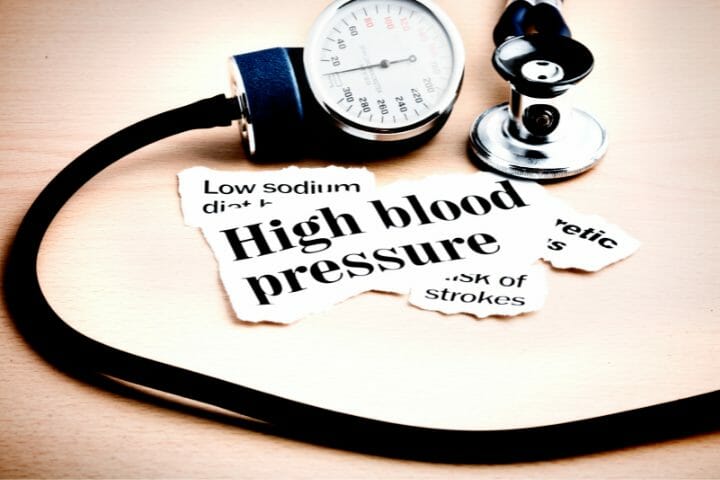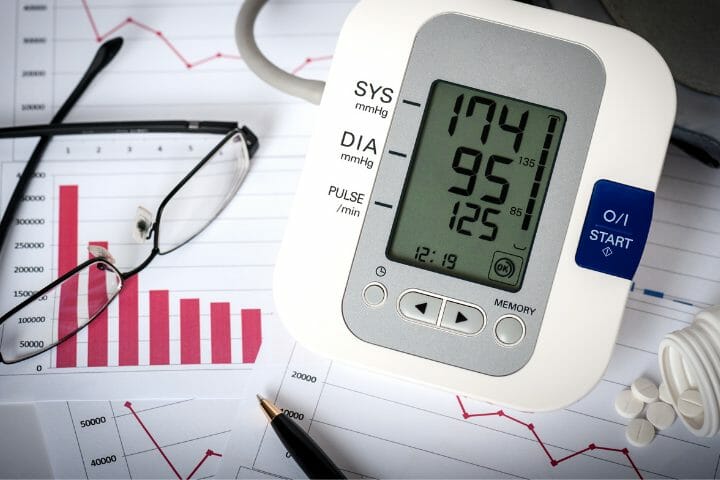High blood pressure is so common these days that we tend to forget how bad it can get. But can you get disability benefits for high blood pressure? Let’s find out how you can get it.
Contents
High blood pressure or hypertension affects about 47% of the adult population in America, about 116 million people approx. A person suffering from high blood pressure will find it difficult to get social security disability benefits for high blood pressure. The social security blue book no longer has specific listings for high blood pressure.
The extent of your disability depends on what is the damage done to your body by high blood pressure. There are some patients with high blood pressure that suffer from hypertension.

Hypertension also leads to wear to the arteries, ultimately causing heart diseases. You can get disability benefits for high blood pressure as there are other ways around it, further below the article.
Is High Blood Pressure a Disability?
High blood pressure is standard in adults because of individuals’ unhealthy and hectic lifestyles. Unfortunately, high blood pressure is not a disability under SSA since it affects a significant chunk of the population.
Although according to the Social Security Administration, high blood pressure is no longer a viable cause for making you eligible for social security disability benefits.
If high blood pressure has created many other health issues that prohibit you from working with your complete focus, you might be able to get disability benefits. If you cannot work for at least one year because of high blood pressure, the SSA will consider you disabled, and you will be able to qualify for disability.
You might also like to read: Can You Get Disability For Fatty Liver Disease?
How to Apply For Disability with High Blood Pressure?
High blood pressure is a disease that can disrupt an individual’s whole life. The person loses their ability to sleep, deal with stress, and concentrate on things. Even though this condition has a definite impact on your work and personal life, it is still not enough to qualify you for social security disability benefits.
You can get disability benefits if you file your application correctly under the proper listings and conditions following the right process. We will also discuss some tips to help you approach the application correctly. The below passage will also contain some of the things that you should do that will help you to increase your chances of getting the disability grant.
- Document your medical problems: It is ideal for you to document your medical history and concerns thoroughly. High blood pressure usually comes with other medical conditions.
- Many times it is a complication of some other serious medical issue, such as kidney disease. Suppose you are unable to get disability benefits with high blood pressure alone.
- In that case, proper medical background and history of blood pressure readings over a long period of time can help to persuade the social security administration to approve your disability grant.
- If you mention your entire medical history, the social security administration considers all these details before giving their final verdict on any application.
- If your medical records show all the previous attempts at controlling high blood pressure, then there is a good chance for you to get disability benefits. You can also work closely with your doctor to create documents for your condition.

Medical Evidence To Submit To Social Security For Getting Disability Payments
If you submit proper documents of your medical conditions, getting social security disability benefits increases exponentially. It is always good to document your medical history with appropriate records.
A proper medical doctor should report all the prescriptions given to you by your doctor, your exercise routine, your diet chart, etc. You can also mention the other lifestyle changes you had at your doctor’s suggestion if you want. Your file must contain:
- Blood pressure readings
- Test results related to high blood pressure include kidney tests and sugar tests.
- Treatment taken to get rid of the disease and changes in lifestyle.
- Symptoms of hypertension.
- Medical records of other conditions that impact your ability to work.
You might also like to read: Can You Get Disability For Fatty Liver Disease?
What Is The Disability Listing Under The SSA Regulations?
The SSA has unique rules and regulations for exceptional people with disabilities. The social security administration prepares a listing that contains all the disabilities and the requirements for the individuals to qualify as disabled under their guidelines.
Following these guidelines protects the employees from workplace discrimination. These employees also get some special treatment and facilities to help them cope with their disability issues and work.
For high blood pressure, there is no direct listing. Still, if it leads to other medical conditions or if other medical conditions lead to high blood pressure, you can avail the benefits under that particular medical condition.
For example, if high blood pressure leads to heart disease, you can benefit from section 4, which deals with Cardiovascular System. If some brain disorder leads to high blood pressure, you can benefit from section 11.4, which deals with Central Nervous System Vascular Accident.

What Are The Tips On Applying For Disability Payments With High Blood Pressure?
Many people are not aware of the proper way to apply for disability benefits with high blood pressure. Some tips can help the scales tip in your favor.
- You must have a thorough record of all your disabilities and problems. A doctor’s approval of your medical history means a lot. Doctors view high blood pressure as a complex condition that brings other impairments. It is less likely that you will get their seal of approval on high blood pressure alone but showcasing your entire medical history might convince the social security administration to grant you a disability grant.
- If your medical records depict any failed attempts at bringing you back to normal blood pressure, this can also help you get a medical grant for your disability. You will have to thoroughly list all the medications and methods that you followed to control your condition.
- Suppose you want your medical condition to meet the eligibility requirements of the social security administration. In that case, you must make sure that your medical history reflects that you have been suffering from high blood pressure for at least a year. This condition should also prohibit you from working for at least 12 months.
You might also like to read: Can You Get Disability For Being Obese?
Can You Get A Disability For High Blood Pressure And Diabetes?
Yes, you are eligible for a disability grant if you have diabetes and high blood pressure. Under SSA, you can get Type 1 and Type 2 diabetes benefits. Type 1 diabetes is a disability considered by the ADA, ADA is the Americans with Disabilities Act. This is an act that protects employees and workers who suffer from disabilities. These employees should not face any discrimination at the workplace. Instead, they should also get equal employment opportunities.

Hypertension Symptoms and Treatments
Blood pressure is the measurement of the amount of blood the heart pumps and the amount of resistance the blood vessels offer when your blood is flowing through them. If your heart pumps more blood, your coronary arteries will be narrower. The blood pressure has two numbers:-
- The top number, also known as the systolic pressure, measures the pressure inside your arteries. It also indicates the pumping of the blood when your heartbeats. Normal blood pressure rating for systolic pressure is 120 for adults
- The bottom number is also known as the diastolic pressure. It measures the arteries in between the beating of the heart. Normal blood pressure rating for diastolic pressure is 80 for adults.
Usually, people who suffer from high blood pressure are not even aware of this condition. There are no unique symptoms of high blood pressure, even when the blood pressure reaches high levels that are dangerous for a person.
Some people with high blood pressure can have headaches, nose bleeding, short breath, chest pain, vision problems and body ache. But most of these symptoms do not show up until the high blood pressure reaches life-threatening levels.
Typically, doctors suggest hypertension patients take control of their diets and exercise regularly to lower their blood pressure.
If such tips don’t help you lower your blood pressure, you can always switch to medicines and supplements. Many hypertension patients go through a testing phase where the doctors determine which treatments best suit the individual.

At first, the patients with hypertension are given diuretics, and people also call them water pills commonly. The main job of these water pills is to reduce the sodium levels inside the body and retain more fluids inside it. Due to this, the person’s blood pressure reduces; however, they can be seen urinating frequently.
Can You Get A Disability For Hypertension?
You are unlikely to get disability benefits for hypertension as the SSA does not consider hypertension a disability. If you club hypertension or high blood pressure to a condition like diabetes, you have a good chance of getting the disability grant. Showing your entire medical history and hiring an attorney will also help you strengthen your claim.
Frequently Asked Questions
What is the disability rating for high blood pressure?
If you have been in military service, you can get VA benefits for high blood pressure. According to the new guidelines by the VA, you are eligible for a disability grant with high blood pressure in exceptional cases. High blood pressure can get you a disability rating anywhere from 10% to 60%, depending on the severity of your situation.
The 10% disability rating is given if a person has hypertension and their diastolic pressure is between 100 and 109. You will be given a rating of 20% if your diastolic pressure is between 110 to 119. Similarly, the rating keeps on increasing with your diastolic pressure. It is hard to get disability benefits alone based on high blood pressure.
Can you get permanent disability for high blood pressure?
The social security administration will not consider high blood pressure as a disability, so you cannot get permanent disability benefits for it. If you wish to get disability benefits from hypertension or high blood pressure, you must showcase your entire medical history to the SSA.
It is also essential that you show that the high blood pressure you suffer from is a symptom or side effect of other cardiovascular diseases that you suffer from.
The blue book doesn’t contain a list of high blood pressure requirements, but it has some criteria for cardiovascular diseases, which are pretty close to hypertension. You can refer to that list of requirements to know whether you qualify for social security disability benefits or not.
Can you work with high blood pressure?
Yes, you can work with high blood pressure, but you need to follow some precautions and tips to keep your high blood pressure in control and prevent further escalation. Hypertension will have a minimal impact on your work and personal life if you can keep its symptoms and causes under control.
However, some people can get some side effects of high blood pressure, such as dizziness, mood fluctuations, fatigue, and other similar problems.
You can work with high blood pressure without any problems if you eat healthy stuff. Eating a healthy diet will help you keep your blood pressure in control. You can start by reducing the salt intake in your diet, and you should aim to reduce your sodium intake and save it to less than 2,300 milligrams in a day. People who can maintain an ideal weight can also control high blood pressure’s side effects and symptoms.
Is high blood pressure a disability under the equality act?
No, high blood pressure is not a disability under the equality act. According to the equality act, to qualify for disability benefits, there are some specific conditions that the person should fulfill.
Suppose the person suffers from a physical or mental illness that has a long-lasting effect on the person. This condition should also hinder the person’s ability to work properly and complete their day-to-day activities.
On the other hand, if you suffer from high blood pressure along with diabetes, then it is a disability under the equality act of 2010. This is because diabetes has a long-term impact on a person, and it also prohibits a person from performing their duties efficiently.
Wrap Up
High blood pressure is not a disability. Rather it is a condition or a symptom accompanying any other disability. It might not be that easy if you want to avail yourself of social security disability benefits just with hypertension. We suggest that you talk to a good disability attorney as well.
Although if you submit proper medical proof and qualify under the listings given by the social security administration, you stand a chance of getting these benefits. These listings are given above in detail.
Thank you for reading, we hope we covered all the important information that you needed to get disability benefits for high blood pressure. Let us know if you need any more help!

